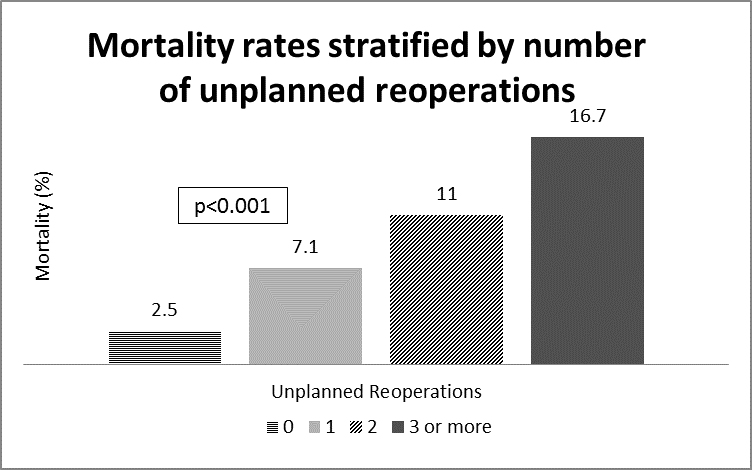|
Back to 2015 Annual Symposium Program
Unplanned Reoperations following Vascular Surgery
Hadiza Kazaure, MD, Venita Chandra, MD, Matthew W. Mell, MD, MS.
Stanford University, Stanford, CA, USA.
Objective: Existing literature on unplanned reoperation after vascular surgery is limited. We characterize the frequency and reasons for 30-day unplanned reoperation after vascular surgery.
Methods: Recipients of vascular procedures in ACS-NSQIP (2012) were abstracted. Unplanned reoperations, captured by a distinct variable now available in the dataset, and their association with readmissions and mortality were analyzed using bivariate and multivariate methods.
Results: Among 35,106 patients in the cohort, 3,545 unplanned reoperations were performed on 2,874 patients. The overall unplanned reoperation rate was 10.1%. Among patients who underwent unplanned reoperations, approximately 80.4%, 15.8% and 3.8% had 1, 2 and ≥3 reoperations respectively; 39.4% of all unplanned reoperations occurred after discharge. Median time to unplanned reoperation was 7 days. Index procedures with the highest reoperation rates were open PVD procedures (38.8%), embolectomy (18.2%), and abdominal bypass (14.4%). The most common unplanned reoperations were incision and drainage, debridement, proximal limb amputations, thrombectomy, and re-exploration for bleeding. Patients with unplanned reoperations had higher rates of readmission (41.8% vs. 7.0%, p<0.001) and mortality (8.0% vs. 2.5%, p<0.001) than those not receiving unplanned reoperations. Mortality increased significantly with each subsequent procedure (Figure). Unplanned reoperation after open AAA repair, TEVAR, and EVAR had the highest mortality rates (23.1%, 22.7%, and 15.8%, respectively). After multivariate adjustment, factors independently associated with unplanned reoperations included emergent procedure (OR: 1.5, 95% CI 1.3 - 1.8), dialysis dependence (OR: 1.5; 95% CI: 1.3 - 1.8), and the presence and timing of a complication relative to discharge. Compared to patients without complications, unplanned reoperation was more likely associated with post-discharge complications (OR: 7.8, 95% CI 6.7-9.1) than inpatient complications (OR: 3.9, 95% CI: 3.5-4.3). Unplanned reoperation was independently associated with mortality in an incremental fashion (OR: 2.0, 95% CI 1.7-2.5 for 1 unplanned reoperation; AOR: 3.1, 95%CI: 2.2-4.2 for ≥2 unplanned reoperations).
Conclusions: Recipients of vascular surgery frequently undergo unplanned reoperations within 30 days of surgery. Unplanned reoperations are associated with both inpatient and post-discharge complications, and result in increased mortality. These findings indicate that unplanned reoperations may be a key component of failure to rescue.

Back to 2015 Annual Symposium Program
|







